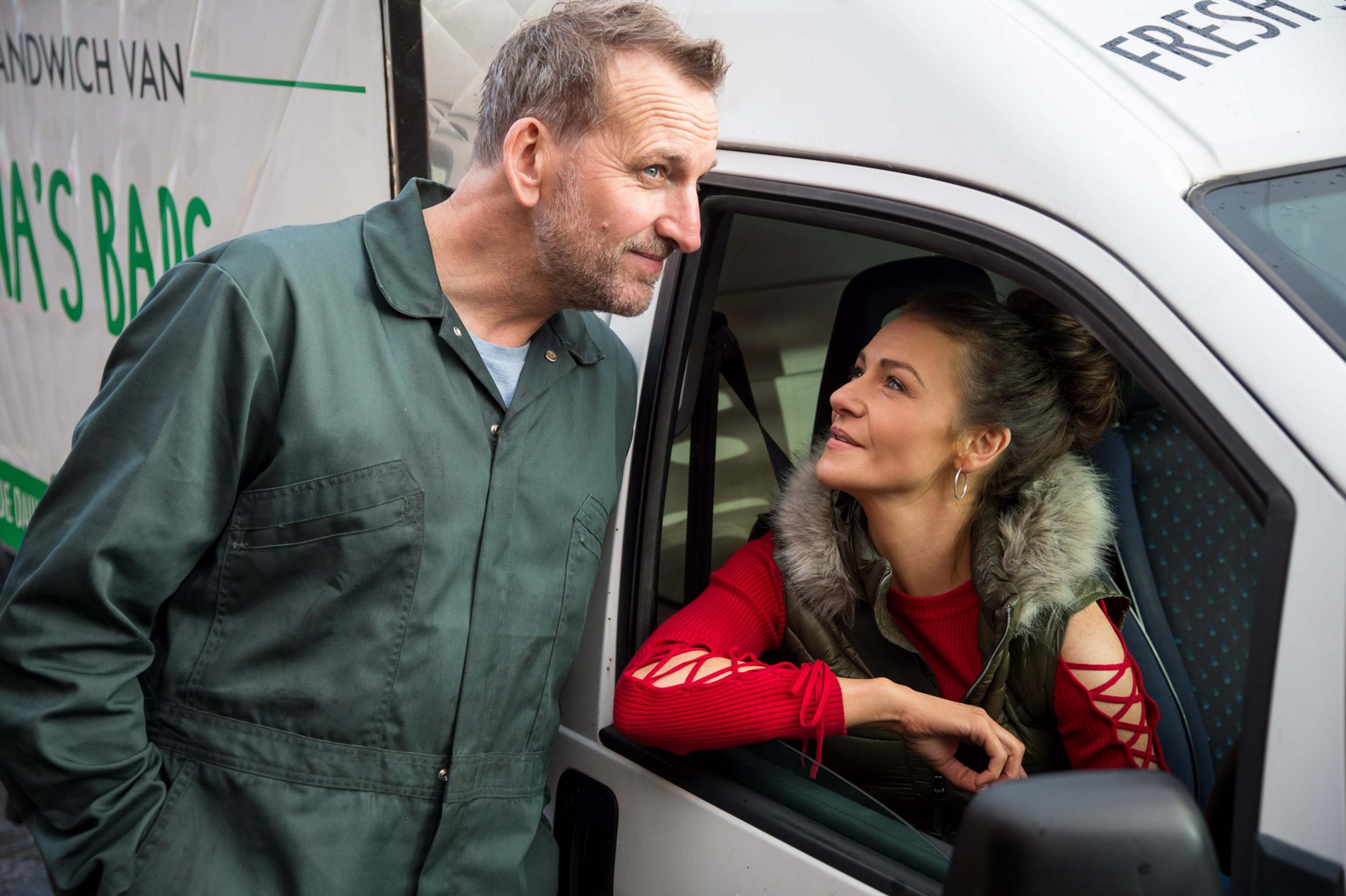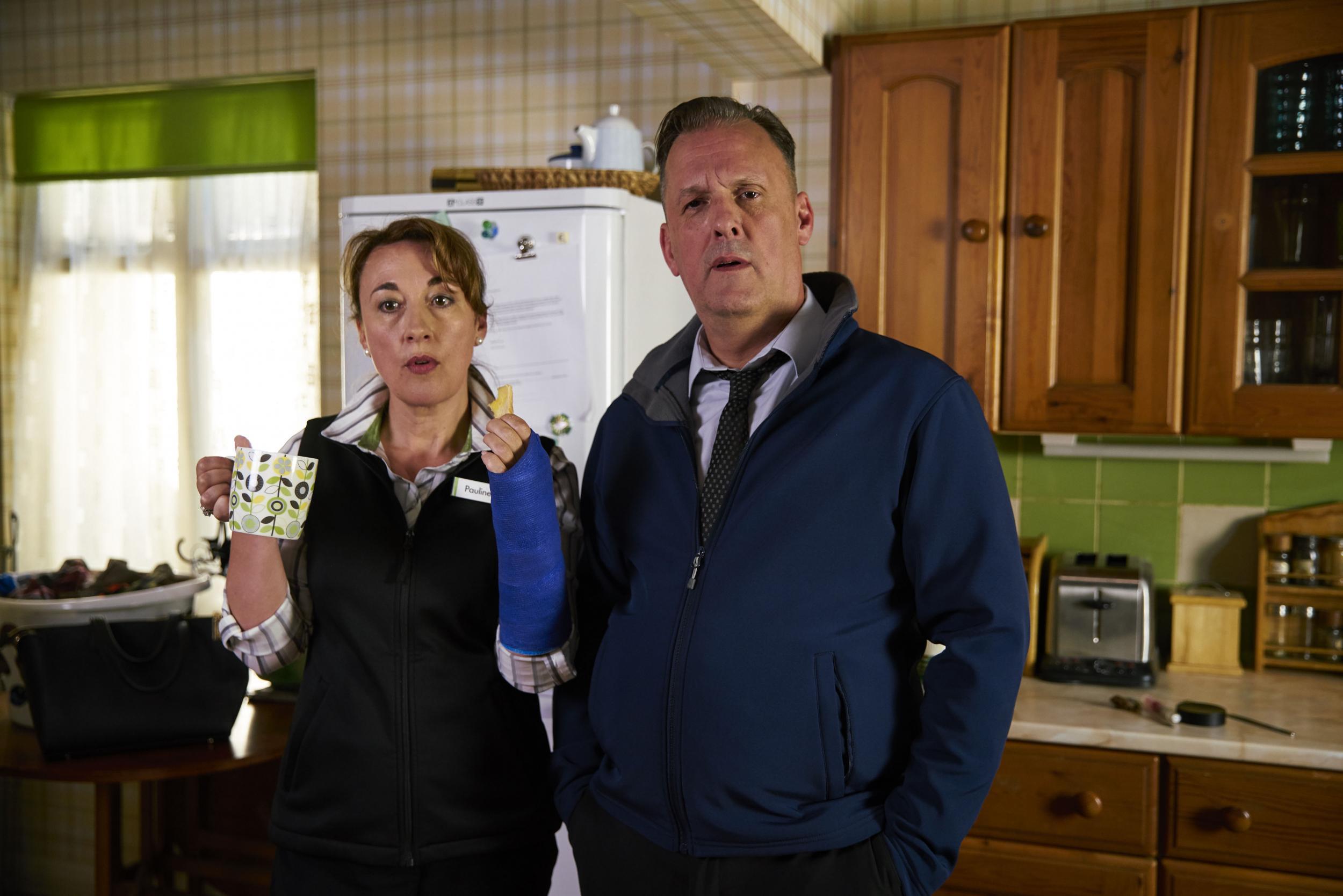TV Review, Come Home (BBC1): A formidable cast wrings the black humour out of a catalogue of disasters
Christopher Eccleston’s lonely and confused single dad is almost Partridge in tone; plus the finale of ‘Mum’ (BBC2)

There were many moments during Come Home when I wondered just how much humiliation could be heaped on Christopher Eccleston’s lonely and confused single dad character Greg. Greg, by the way, is a car mechanic for a living and an everyman for dramatic purposes. (The drama happens to be set in Northern Ireland, too, but with, thus far, no sectarian or Brexit-related intrusions).
Having suffered the trauma of his wife of 19 years, Marie (Paula Malcomson), leaving him and the kids behind for (apparently) no good reason other than that she “wanted some space”, he tries internet dating.
His first encounter went from dull to disaster, I’m afraid. The conversation about recycling regimes at their respective workplaces left little room for saucy innuendo, but there was still, one felt, the slim chance of a shag. Not, though, when an unrealistic volume of condoms tumbled from his wallet as he went to buy his new friend another glass of sauvignon blanc. She scarpered, he was openly mocked by witnesses, and he wound up getting into a fight and – result – drunkenly copping off with the woman who brings the sarnies round to his garage. By the way, that’s Brenna Doyle (played by Kerri Quinn with commendable lustfulness) of Brenna’s Baps (pun intended).
Even that proved slightly more problematic than most one-night stands, and the early frisson of tuna-and-mayonnaise-flavoured romance and enthusiastic love-making became overshadowed by a realisation that this dinner lady had problems of her own – a violent (when not absentee) husband, a mild drink problem, and, consequently, getting a bit too gobby at all the wrong times to Greg’s young kids, still adjusting to life without their mammy.
It all ends with Greg letting himself into his wife’s new house for a look around and then being discovered by her female friend (partner? Lover?) hiding in the shower. That parodic Hitchcock scene, also strongly reminiscent of Peter Sellers in the Clouseau films, was followed by an EastEnders-style public shouting match in the street. As you’d expect.
Of course, the real embarrassment there was that Greg was so blinkered and emotionally thick that he couldn’t spot that maybe his missus left him for another woman and not another man (the latter, to his eyes, would be at least explicable if unforgivable). Perhaps the worst scrape was when Greg was caught dogging with Brenna by the police – and was recognised by the copper. He was lucky to get away with that, and I thought wistfully for a moment whether 30 years of the Troubles had endowed the Police Service of Northern Ireland with a better sense of priorities than those on the mainland. (I hasten to add, I do not condone dogging in any circumstances, but it has always seemed to me a mostly victimless, not to say, dogless “crime”).
Somehow, the formidable cast made this catalogue of disasters seem grim, tragic and drenched in black humour rather than like an episode of the new Alan Partridge series. I say that because Alan has been the most humiliated figure in British TV for decades now, thanks not least to his estrangement from wife Carol and children Denise and Fernando Partridge.
In terms of the “themes”, as they say, there is indeed no shortage of autumnal material on our screens, mirroring the ageing British demographic. One of the odd outcomes of people living longer is that they have much more time to fall out of love, or lose a partner to old age, and correspondingly and cruelly far fewer opportunities to fall back in love, especially if they can’t get the hang of internet dating or contactless payment machines. It’s possible that the handsome Greg, and his ex for that matter, will confound the odds, and that’s why I’ll be watching the next episodes. There may be lessons there for all of us, sooner or later.

One happy ending for a late-middle-aged couple looking for love arrived in the final episode of Mum. This gentle (in a good way) sitcom by Stefan Golaszewski has managed to sustain its run well. Obviously that was down to the excellent work of Lesley Manville as the 60-year-old widow Cathy, and Peter Mullan as her overly diffident friend/suitor Michael.
Much to everyone’s relief, Cathy managed to say some mushy things to Peter about missing him loads, and that bravery that saved her from taking another terrible emotional hit. Schmaltzy as it was, even a hard-hearted sod like me was lifted by it.
However, the show was, once again, stolen by Cathy’s megasnob sister-in-law, Pauline. Dorothy Atkinson plays her as a more spiteful version of Hyacinth Bucket, with Ross Boatman playing the part of hen-pecked partner, Derek. Her inventory of her class-conscious tastes was a sharp as any bit of social observation of contemporary Britain I’ve heard lately. As she icily correcting her partner: “Not a sob, Derek. I just enjoy the finer things in life. Radio 4. Classic FM. Anything made by an artisan. Golf. Wimbledon. Jazz. The Tate. Sailing. Fountain pens. Skiing. Cheese. Seafood. Wine you can’t buy in the supermarket. Coffee beans. Manuka honey. Kent.”
I know spin-off series are a bit 1970s, but Pauline and Derek really need their own show. I hope Mr Golaszewski can oblige. After that, he may take his retirement.
Join our commenting forum
Join thought-provoking conversations, follow other Independent readers and see their replies
Comments
Bookmark popover
Removed from bookmarks